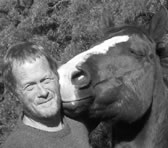31 July 2007
World-Wide Webley-Smith
 Image: Martin Wesley-Smith
Image: Martin Wesley-Smith Unless something has been documented, it effectively never existed...After many years of living apart, my twin brother Peter and I are living under the same roof again. As, inevitably, we reminisce about our childhood, in between castigating younger generations, we’re finding that we can no longer rely on memory as a reliable chronicler of past events. An example: once, in kindergarten, I was riding a tricycle down a steep slope at great speed when one of my big toes got caught in the spokes of the front wheel, sending me flying over the handlebars. This was the most traumatic event of my life up until that point, and my memory of it has stayed with me, vividly, ever since. But when I recently mentioned it to Peter, he said ‘That wasn’t you – that was me’! Since our old Mum Sheila doesn’t remember it, and we can’t find any documentation of it, we have no way of knowing whose memory is correct. Or even if in fact the event happened at all.
Unless something has been documented, it effectively never existed. Memory alone – unreliable and short-term – is not enough. What is truth? Where is it? These questions are up there with the two other great questions of our time: does God exist, and what do women really want?
For a few years now I’ve maintained several websites, including a sporadic blog (www.shoalhaven.net.au/~mwsmith/blog). One of its functions is that of a diary in which I record significant events – musical and/or personal – as they happen. If I want to know the date of a first performance, say, or which day our old horse died, I go to the blog. Wondering if I still exist, I check: yep, there’s I, blinking at me from cyberspace. I blink, therefore I am.
I occasionally blog my views on political issues. While I could harangue a post in the garden, blogging these views has the advantage of making it easier for the government to get me under the new sedition laws. Saves time and money.
When I put on a concert, I create a website documenting it. A recent one (www.shoalhaven.net.au/~mwsmith/khl) served three functions: 1. I sent its URL to various friends, who sent it on to other friends, and so on: viral marketing; 2. it serves for all time (or for as long as I keep paying my ISP account, whichever is shorter) as a record of the concert; 3. it supplied to any member of the audience who cared to look detailed program notes, with links, thus saving paper.
A local choir contributed to the concert. A separate website (www.shoalhaven.net.au/~mwsmith/khlchoir) allowed choir-members to download the sheet music they needed, plus rehearsal MIDI files so that they could learn their parts in between rehearsals.
I’ve started acting as a publisher of my own music by putting downloadable scores on the Web (e.g. www.shoalhaven.net.au/~mwsmith/condofiddle). Perhaps later on I will set up an e-commerce facility, but for now I’m content to let people download pieces for free. When doing concert tours I put program notes, photographs, technical requirements etc. onto a website (e.g. www.shoalhaven.net.au/~mwsmith/ttttour4) so that concert organisers can download what they need. This saves money and resources as well as hassle. I’m planning to disseminate recordings, tape parts, and audiovisual pieces this way too.
A friend of mine in England rang the other day to say she was sorry about our horse – she’d read about his death on my blog (www.shoalhaven.net.au/~mwsmith/blog). An American saxophonist had read about my piece Weapons of Mass Distortion and wanted to play it. A Dutch activist, having read of my interest in West Papua, wants to send me some photos. All this, and more, through the Web – yet we’ve hardly started to exploit it.
© Australian Music Centre (2007) — Permission must be obtained from the AMC if you wish to reproduce this article either online or in print.
Subjects discussed by this article:
Martin Wesley-Smith is a composer with eclectic tastes and interests, his output ranging from children's songs to environmental events. Currently, his main interests include choral music, computer music, and audiovisual pieces.
Comments
Be the first to share add your thoughts and opinions in response to this article.
You must login to post a comment.